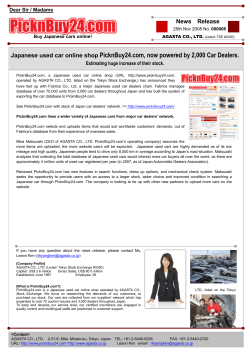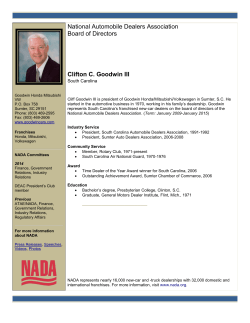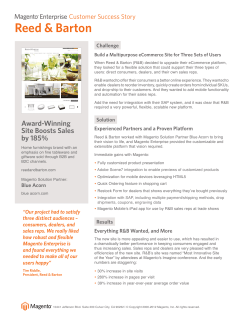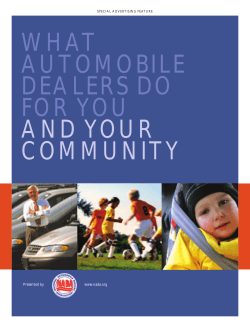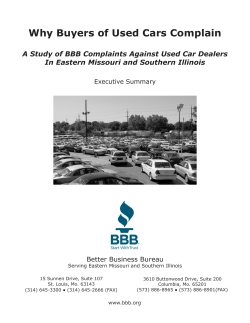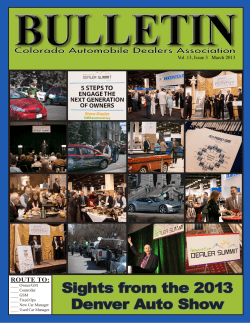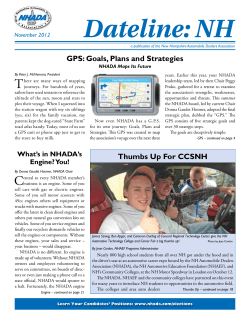
Senator Ted W. Lieu 28 Senate District
Senator Ted W. Lieu 28 th Senate District Purpose: ‘Buy Here, Pay Here’ used-car dealers prey on desperate workers and low-income families by financing overpriced cars at ransom-level interest rates. They do this by targeting people who need cars to get to work and manage the daily necessities of life, but cannot qualify for conventional car loans. These dealers markup aging, auction-bought cars more than 200 percent, charge 30-percent-andhigher interest rates, and aggressively push customers to default on their loans. The result: About a fourth of these cars are quickly repossessed, allowing the dealers to keep the down payment, plus any cash installments that have been made. Senate Bill 956 aims to regulate Buy Here, Pay Here dealers by requiring them to obtain a California Finance Lenders license from the Department of Corporations; capping the interest rates charged to consumers; and expand repossession laws to include additional consumer protections. Background: Buy Here, Pay Here used car dealers are a largely unregulated industry that has taken advantage of a gap in regulations. This has allowed predatory lending to victimize vulnerable populations. These abuses were documented in a fall 2011 investigative series by The Los Angeles Times that exposed the suspect business practices of these below-the-radar dealerships. The interest on loans associated with Buy Here, Pay Here dealerships is several times higher than the market rate for used car loans, and the dealers charge up to three times the Bluebook value of the vehicle. Many of the loans require customers to make substantial down payments and physically return to the dealership to make twice-monthly payments. These dealers finance the sales of these usually road-worn vehicles at interest rates that forces customers to default at a 25-percent rate. When the customer defaults, the dealer repossesses the car and resells it to another customer – thus gaining yet another down payment and yet another predatory loan. Some vehicles have been sold, repossessed and re-sold as many as eight times, according to The Times. There are a number of intriguing facts that speak to the questionable practices of BHPH dealerships: • • • • • Buy Here, Pay here dealers differ from more traditional car sellers in that the dealers ‘hold’ the car loans, instead of selling it off to a third-party lender, such as a bank or finance company. This is often unknown by the car buyer. • Buy Here, Pay Here dealerships sold 2.4 million automobiles in 2010, up from 1.3 million in 2000. Market research estimates there are up to 33,000 such lots nationwide, compared to 22,000 new car dealerships. Buy Here, Pay here dealerships make about $80 billion in loans annually, according to the Federal Insurance Deposit Corp. Profit margins average about 40 percent, which doubles what new car dealerships typically earn according to a trade group, the National Alliance of Buy Here, Pay Here Dealers. Interest rates for loans from the dealerships can top 30 percent. Average rates at other used-car dealers for customers with good credit range from 5 to 8 percent, according to HSH Associates. About one in four buyers at Buy Here, Pay Here dealerships default. Senator Ted W. Lieu 28 th Senate District Deficiency in Current Law: Current law states that used car dealers offering Buy Here, Pay Here loans are exempt from the laws associated with finance lenders and the protections applied for consumers. The Rees-Levering Automobile and Sales Act does apply to Buy Here, Pay Here dealers yet these regulations treat all car dealers the same regardless if the dealer acts like a financial institution. Consequently, the consumers of Buy Here, Pay Here dealers are suffering due to the lack of regulations that would otherwise protect them from dubious business practices. The federal Used Car Rule is generally limited to warranty information, and the Truth in Lending Act only requires dealers to provide certain information to consumers before making a loan. While the newly formed Consumer Financial Protection Bureau has authority over Buy Here, Pay Here dealership, the bureau has not indicated that these dealers will be a focus of its efforts, according to The Times This Bill: SB 956 seeks to create consumer protections from the financial practices of Buy Here, Pay Here usedcar dealers and to limit this business model that ratchets up profits by exploiting customers. 2. Limit Buy Here, Pay Here used-car installment loans and leases to a maximum 17.25 percent interest, which would give California the strongest interest cap in the nation. Specifically, SB 956 limits the interest rate to 17 percent plus the federal funds rate. This would allow for fluctuations in the market to reasonably move the interest cap. 3. Change the way Buy Here, Pay Here dealers are able to repossess vehicles to include a 10-day grace period, consumer protections typically offered by most car dealers. It would also make it easier for buyers to reinstate a repossessed car. Support: AFSCME, AFL-CIO California Immigrant Policy Center Center for Responsible Lending Consumer Attorneys of California Consumer Federation of California Consumers for Auto Reliability and Safety (CARS) El Segundo Chamber of Commerce LAX Costal Area Chamber of Commerce National Consumer Law Center Silicon Valley Community Foundation Torrance Area Chamber of Commerce Oppose: SB 956 has three major goals: 1. Impose first-ever regulations on used-car dealers offering Buy Here, Pay Here loans by requiring them to obtain a California Finance Lender’s license, which would provide customers with an array of protections. These protections include disclosures on the consumer’s rights, interest rates and investigation agencies as well as prohibitions on false, misleading or deceptive statements and advertisements by dealers. Antelope Valley Chamber of Commerce Antelope Valley Hispanic Chamber of Commerce Leedom Group National Alliance of Buy Here Pay Here Dealers National Independent Automobile Dealers Assoc. And three individual Car Dealers Senator Ted W. Lieu 28 th Senate District Staff Contact: Policy: Cliff Costa, Legislative Director (916) 651-4028 or Cliff.Costa@sen.ca.gov Press: Ray Sotero, Communications Director, (916) 651-4028 or (916) 834-1128 cell or ray.sotero@sen.ca.gov
© Copyright 2025


